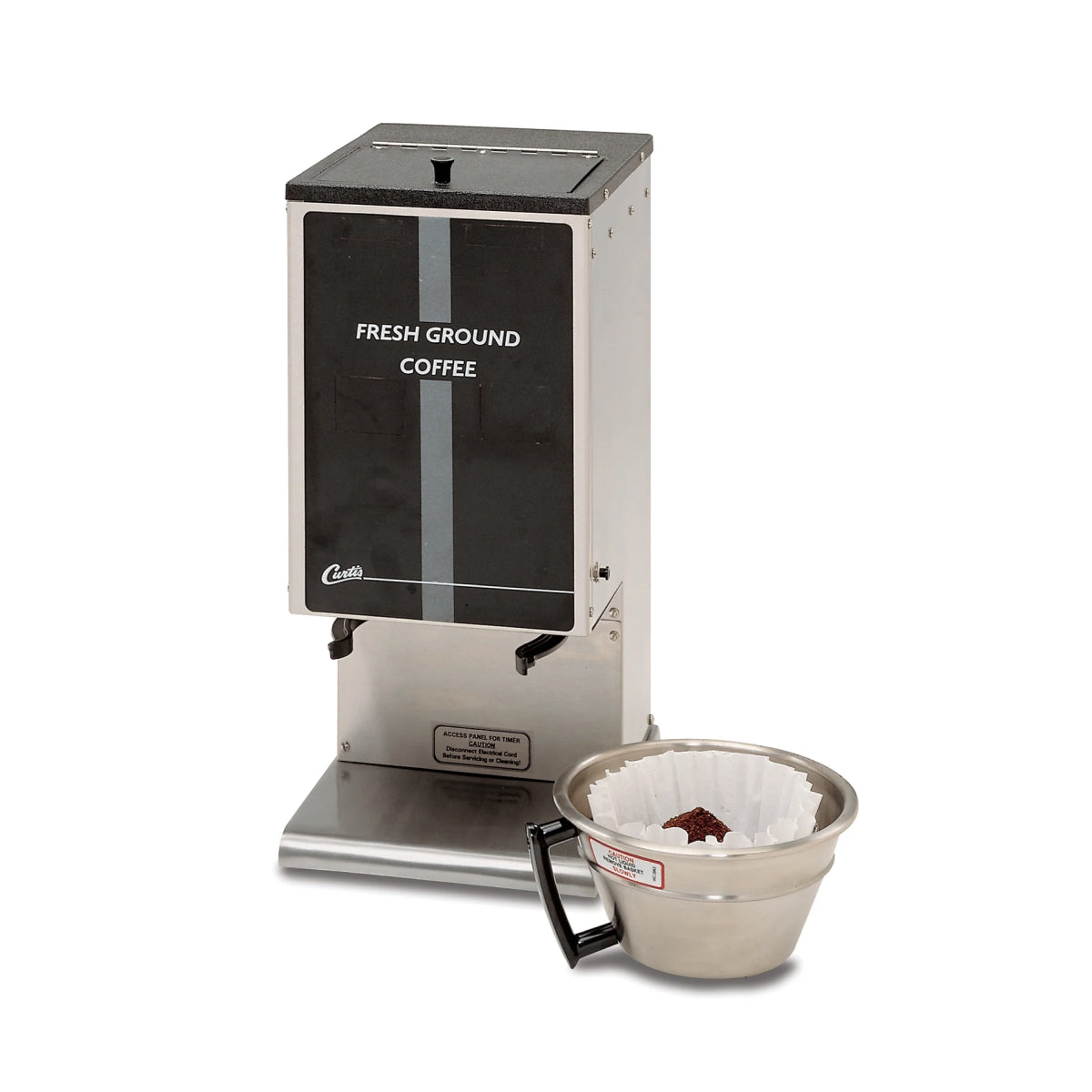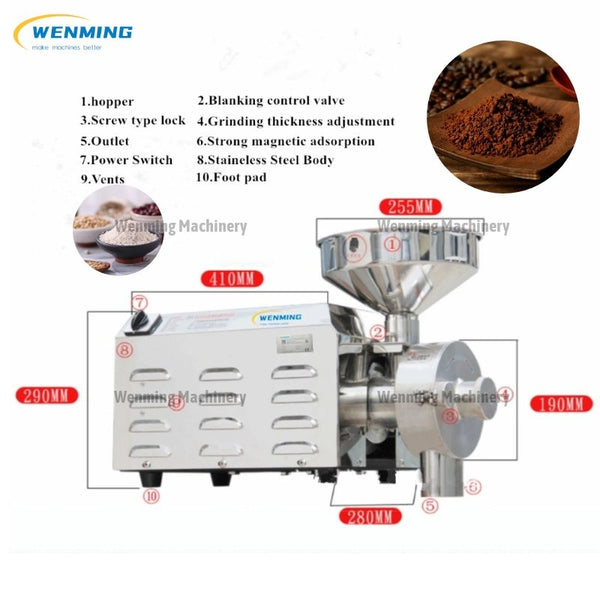Just How to Choose the Perfect Industrial Coffee Mill for Your Organization
Selecting the optimal commercial coffee grinder for your organization is a complex decision that requires careful consideration of several important aspects. In addition, comprehending the numerous kinds of grinders offered can significantly affect your functional performance.
Assess Your Grinding Needs
When choosing a commercial coffee mill, one should initially analyze their grinding requirements to ensure ideal performance and consistency. This first analysis includes recognizing the volume of coffee to be processed daily, as well as the desired grind dimension for various developing techniques. A high-capacity mill may be needed for organizations serving huge amounts of coffee, while smaller sized procedures may locate a much more portable design adequate.
Additionally, it is essential to take into consideration the kinds of coffee beans being used, as various beans may need certain grinding strategies to accomplish the best taste account. Oily beans could require a grinder developed to manage such attributes without clumping or overheating.
Specialized coffee businesses commonly require accurate work dimensions to improve removal and taste, making it important to select a mill that can deliver uniform outcomes. Reviewing the available area and electric needs will assist in choosing a mill that fits seamlessly into your functional operations.
Understand Grinder Types
Comprehending the numerous kinds of industrial coffee mills is crucial for making a notified option that meets particular functional needs. There are primarily two groups of mills: blade grinders and burr mills.
Blade grinders make use of spinning blades to slice the coffee beans, resulting in an irregular grind size - Industrial Coffee Grinder. While they may be extra budget friendly, they are frequently not suitable for commercial applications where precision is important
On the other hand, burr grinders offer a more uniform grind by squashing the beans in between 2 surface areas. They can be additional categorized into level burr and conelike burr mills. Apartment burr grinders provide a constant grind size and are normally preferred for coffee preparation, while conical burr grinders are versatile and can handle a variety of mixture approaches, from espresso to French press.
When selecting a grinder, consider the details requirements of your service, including desired work consistency, production quantity, and the sorts of coffee beverages you intend to supply - Industrial Coffee Grinder. Each mill type has its benefits and constraints, so understanding these subtleties allows notified decision-making that lines up with operational objectives
Evaluate Grind Size Uniformity
Attaining work size uniformity is necessary for creating top quality coffee, as variants in bit size can dramatically affect removal and flavor. When picking an industrial coffee grinder, it is vital to assess how well the maker maintains harmony in grind size throughout different sets. Inconsistent work dimensions can lead to irregular extraction, resulting in a mug that may taste extremely bitter or weak.
To examine grind size uniformity, take into consideration grinders with attributes such as adjustable work settings and top quality burrs. Burr mills, specifically, master producing uniform fragment sizes compared to blade mills. The product and shape of the burrs play a crucial duty, with stainless steel and ceramic choices offering durability and precision.

Think About Manufacturing Ability
In the busy world of coffee production, thinking about production ability is critical for businesses aiming to fulfill demand without sacrificing high quality. The manufacturing capability of an industrial coffee grinder straight influences a firm's ability to meet orders successfully, take his response care of stock, and react to rising and fall market trends.
When analyzing manufacturing ability, it is important to examine the grinder's outcome rate, generally measured in extra pounds per hour. This dimension must line up with your service's forecasted sales volume and development targets. As an example, a coffee shop with a high turnover may call for a mill that can process a number of hundred pounds daily, while a smaller procedure may be sufficient with a lower capacity version.
Furthermore, consider the sort of coffee being processed. Various beans and blends might impact grinding rate and effectiveness, necessitating a mill capable of taking care of diverse production demands. It's likewise worth factoring in the mill's ability to maintain regular high quality under high output conditions, as any kind of changes can impact the last product.
Inevitably, choosing a mill that matches your service's production capability will guarantee you remain affordable and responsive to customer assumptions.

Spending Plan and Upkeep Aspects
When examining the right commercial coffee grinder, upkeep and spending plan aspects play a significant function in the general decision-making procedure,. A first investment in a high-grade grinder can generate long-lasting advantages, yet it's important to establish a clear budget plan that straightens with your organization's operational needs. Consider both the purchase cost and prospective functional expenses, such as power usage and substitute components.
Upkeep is an additional essential facet that can impact your budget. Industrial coffee grinders require normal maintenance to ensure optimal efficiency and long life. Review the supplier's referrals for upkeep, consisting of cleansing routines and parts replacement, as these will affect long-term functional prices. In addition, take into consideration the accessibility of service and support, as dependable support can mitigate downtime and repair expenditures.

Investing in a mill that is long lasting yet easy to keep can conserve money with time. While lower-priced choices might be appealing, they might incur greater upkeep expenses and minimized efficiency. Inevitably, stabilizing preliminary prices with long-lasting upkeep and functional efficiency will lead you to the most effective option for your business's coffee grinding demands.
Final Thought
Choosing the excellent commercial coffee mill demands a comprehensive assessment of grinding requirements, grinder types, grind size consistency, production capacity, and monetary considerations. A well-chosen grinder not only enhances the quality of the coffee produced yet additionally adds to the total success and productivity of the venture.
Specialized coffee organizations usually require exact work sizes to enhance extraction and taste, making it essential to pick a mill website link that can provide uniform outcomes. Apartment burr grinders provide a consistent grind dimension and are normally preferred for espresso preparation, while conelike burr mills are flexible and can deal with a range of mixture techniques, from espresso to French press.
When choosing a commercial coffee mill, it is important to assess how well the equipment preserves uniformity in work dimension across various batches. Burr grinders, in certain, stand out in producing consistent bit sizes contrasted to blade grinders.Picking the suitable industrial useful reference coffee mill requires a comprehensive analysis of grinding requirements, grinder kinds, grind size uniformity, production capability, and budgetary factors to consider.